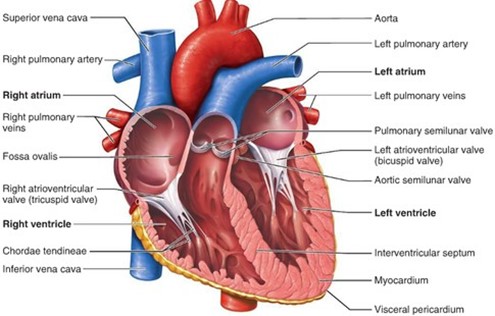The right atrium receives blood directly from:
The superior vena cava, inferior vena cava, and coronary sinus.
The superior vena cava and inferior vena cava only.
The superior vena cava, inferior vena cava, and pulmonary veins.
The pulmonary veins.
The Correct Answer is A
The right atrium receives blood directly from the superior vena cava, inferior vena cava, and coronary sinus.

The superior vena cava and inferior vena cava bring deoxygenated blood from the upper and lower body, respectively.
The coronary sinus brings blood from the heart muscle.
Choice B is wrong because it excludes the coronary sinus, which also empties into the right atrium.
Choice C is wrong because it includes the pulmonary veins, which carry oxygenated blood from the lungs to the left atrium, not the right atrium.
Choice D is wrong because it only includes the pulmonary veins, which are not connected to the right atrium at all.
Nursing Test Bank
Naxlex Comprehensive Predictor Exams
Related Questions
Correct Answer is A
Explanation
Capillary walls consist of a single layer of epithelial cells, and they exchange substances in the blood for substances in the tissue fluid surrounding body cells.
This single layer of cells is called the endothelium and it forms the barrier between the blood and the interstitial fluid.
The endothelium can be either continuous or fenestrated, depending on the tissue type and function.
The capillaries are very thin and allow red blood cells to flow through them single file.
The capillaries also have a layer of a glycoprotein called the glycocalyx that covers their luminal surface.
Choice B. False is wrong because it contradicts the definition and structure of capillaries.
Capillaries are not made of multiple layers of cells, nor do they prevent the exchange of substances between the blood and the tissue fluid.
Correct Answer is C
Explanation
This is because it is an example of a positive feedback loop, which amplifies the change and moves the system away from its normal state.
A negative feedback loop is a mechanism that reverses a deviation from the set point and maintains homeostasis.
Choice A is wrong because increasing heart rate and force of contraction when blood pressure falls is a negative feedback loop that restores blood pressure to normal.
Choice B is wrong because secreting insulin after a meal to return blood sugar concentration toward normal is a negative feedback loop that regulates glucose levels.
Choice D is wrong because shivering when body temperature falls below normal is a negative feedback loop that increases heat production and raises body temperature.
Normal ranges for blood pressure are 90/60 mmHg to 120/80 mmHg, for blood glucose, are 70 mg/dL to 140 mg/dL, and for body temperature are 36.5°C to 37.5°C or 97.7°F to 99.5°F.
Whether you are a student looking to ace your exams or a practicing nurse seeking to enhance your expertise , our nursing education contents will empower you with the confidence and competence to make a difference in the lives of patients and become a respected leader in the healthcare field.
Visit Naxlex, invest in your future and unlock endless possibilities with our unparalleled nursing education contents today
Report Wrong Answer on the Current Question
Do you disagree with the answer? If yes, what is your expected answer? Explain.
Kindly be descriptive with the issue you are facing.
